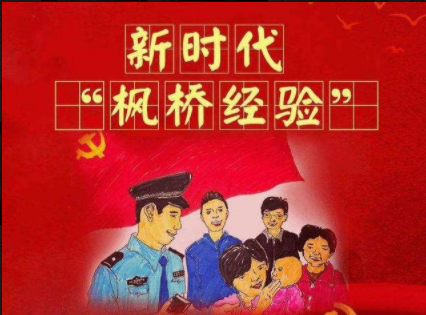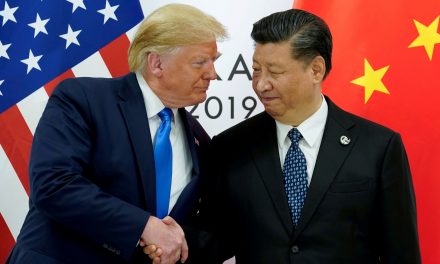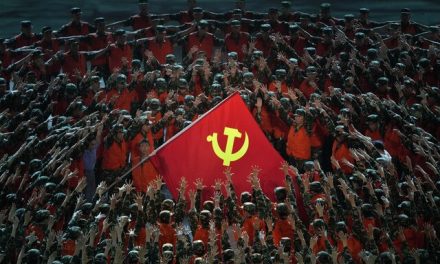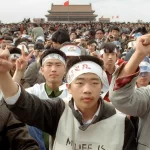By Emily
Editor’s note: Xi Jinping has recently invoked the Maple Bridge episode, referring to of a number of instances in which Mao Zedong invoked supposed particular local incidents to achieve his political goals, including combating political enemies. The author here analyzes what this signifies.
Thinking about the “Maple Bridge” experience
On November 6, 2023, China’s Xinhua News Agency reported that Xi Jinping met with high-level national representatives of those implementing “Maple Bridge Style Work Methods” at the Great Hall of the People in Beijing. High-ranking officials such as Political and Legal Affairs Committee Secretary Chen Wenqing and Public Security Minister Wang Xiaohong also appeared at the meeting. Xi Jinping congratulated the representatives on their outstanding achievements in working for the masses, and encouraged them to continue to work persistently to uphold and develop the lessons of this Maple Bridge experience in Xi’s so-called new era.
The Maple Bridge experience refers to a political campaign promoted by Mao Zedong in the 1960s. Its core idea was to maintain social stability by mobilizing the masses rather than relying solely on the official authorities, and to exercise dictatorship over so-called “class enemies.” Judging from historical experience, re-implementation again of this Maple Bridge experience will inevitably weaken the principles of the rule of law and protection of human rights, derail the political system from any reasonable institutional path, and will be accompanied by strong, thorough suppression of ideas, thus inhibiting the application of social wisdom and innovation. In fact, during the Mao era, the Maple Bridge episode promoted and led to large-scale repression. During this process, many people suffered severe political persecution from the resultant “dictatorship of the masses” because of the political label affixed to them as hostile elements, persecution including the loss of property, freedom, and even life.
Aligning with Mao Zedong thought
Xi Jinping’s governing philosophy has always been intrinsically aligned with that of Mao Zedong. Xi first proposed the concept of a “new century” at the annual work conference of Chinese diplomatic envoys stationed abroad in December 2017. He believed that the global political landscape was about to be reshaped, hinted that China would emerge at the top after this major change, and that its and Xi’s global status would be enhanced. Thus his real purpose is to break the existing world order led by the United States with liberal democracy as its core, and gain space for the survival and further development of the CCP’s long-term one-party dictatorship.
In 1957, when Mao Zedong visited Moscow, he also said that “the east wind prevails over the west wind.” This was done in an attempt to emphasize China’s rise and its ability to surpass the West, thereby proving the legitimacy of the regime he was leading, and building momentum to improve China’s status in the communist camp. Soon after, Mao launched the Great Leap Forward, a movement whose goal was to quickly transform China from an agricultural society into a socialist industrial power, with a popular slogan at the time being “surpass Britain and catch up with the United States.” However, the Great Leap Forward was a fantasy riven with darkness, a mistake that resulted in widespread famine, economic chaos, and social unrest. Once the famine had become widespread, Mao Zedong asked the Chinese to “tighten their belts,” and also to vigorously support revolution in the Third World. Later, to correct the mistakes made during the Great Leap, Liu Shaoqi and Deng Xiaoping led economic adjustments in the direction of moderation, in an attempt to repair the economic and social damage. Mao Zedong was worried that these corrective measures led by Liu and Deng would erode the achievements of the Chinese revolution and lead to the revival of capitalism. At the same time, he was even more afraid of losing the power he already had. Therefore, he launched many mass movements, including the so-called Maple Bridge episode, which led to China entering a quagmire of further disaster.
Obviously, Xi Jinping has realized that he is facing many complicated, severe challenges. On May 30, 2023, he stated at the National Security Work Conference, “We must adhere to bottom-line and unconventional thinking, and be prepared to withstand major tests amid high winds, and rough and even stormy seas.” Externally, he has taken many preventive measures, including food independence, in response to possible economic decoupling from Western countries. Furthermore, in August 2023, he participated in the BRICS Summit in South Africa, and announced that US$4 billion would be allocated for the BRICS countries to establish a special fund for global development and South-South cooperation, and an additional US$10 billion would be allocated to support his personal global-development initiative. Internally, in the face of various intensifying social conflicts, and under the circumstances of economic decline and increasing financial constraints, it has been difficult for the CCP to continue its strategy of spending money to buy the maintenance of stability and peace, so it has turned to the low-cost Maple Bridge model. It can be seen that Xi Jinping’s method of dealing with the predicament will be as Mao Zedong’s was, closing the country, intensifying internal oppression, and spreading money around externally to win international support from economically underdeveloped countries.
A Xi Jinping-style fortress
After the CCP’s 20th National Congress, Xi Jinping began to lead his team of cronies, the “Xi Family Class,” as the “people’s leaders.” The new leadership certainly hopes to demonstrate to the international community and its own people its ability to govern, and to prove the legitimacy of its rule-breaking regime. However, after getting rid of the world’s most stringent epidemic prevention and control measures, China’s economy did not undergo the expected rapid rebound. Instead, it faced a series of major difficulties, such as the unstable real-estate market and the “de-risking” strategies of various countries. Risks China itself faces include declining exports, weak consumer spending, high youth unemployment, and local government debt issues, all influenced by CCP policies. At the same time, and to make matters worse, China’s relationship with Western, economically developed countries, especially the United States, is becoming increasingly antagonistic. And because of its huge trade surplus with the United States, China regards economic and trade cooperation as the ballast and propeller of Sino-US relations.
At a campaign fundraiser in June 2023, President Joe Biden used the term “dictator” to describe Xi Jinping, because at the 20th National Congress, Xi Jinping established a dictatorial regime that places him in power for life. Moreover, in September 2023, U.S. Secretary of State Blinken pointed out in a speech at Johns Hopkins University that China is one of the most significant and long-term challenges facing the world because China not only “aspires to reshape the international order, but also increasingly China has the economic, diplomatic, military and technological power to achieve this goal.” Blinken also said the U.S.’s current “strategy is centered on reengaging, revitalizing, and reimagining our most important strategic asset: America’s alliances and partnerships.” Therefore, although Sino-US relations have recently eased on the surface, this is only temporary cooperation between the two sides due to the urgent needs generated by short-term interests, and cannot substantially change the long-term trend of Sino-US confrontation.
The Wall Street Journal’s China correspondent James T. Areddy likened Xi Jinping’s strategy to the old one of building the Great Wall to guard against external threats. However, within China, the disappearance of senior officials in Xi’s inner circle, such as Foreign Minister Qin Gang, undoubtedly shows that serious differences have emerged in Xi’s core leadership, because China’s economy has encountered huge problems under the personal guidance of its top leader. However, there is no doubt that Xi Jinping will use iron-fist measures to maintain his Xi-style fortress, not only imitating Stalin in carrying out purges within the party, but also imitating Mao Zedong in carrying out a sustained struggle movement. Recently, the Xi regime has repeatedly called for learning from and carrying forward the “Maple Bridge experience,” indicating that he intends to follow Mao Zedong and plan in advance to deal with various opposition forces by launching mass movements, resembling this campaign if he is encounters problems in the game he is playing.
Although the “Maple Bridge Style work method” temporarily benefited Mao Zedong’s consolidation of authoritarian power through mass movements, it aggravated humanitarian catastrophes and damaged the CCP’s rule. Today, Xi Jinping’s advocacy of the “Maple Bridge experience” shows that he is facing dissatisfaction from all sides and has exhausted all available resources. It also indicates that China’s already deteriorating human-rights situation and legal environment will become even worse. The Maple Bridge experience is actually a Maple Bridge lesson, and Xi Jinping’s drinking poison to quench his thirst will only bring about the ultimate destruction of his stronghold.
This piece was translated from Yibao Chinese. If republished, please be sure to add the source and link https://www.yibao.net/?p=247647&preview=true before the text when reposting.
The views of the author do not necessarily represent those of this journal.




















